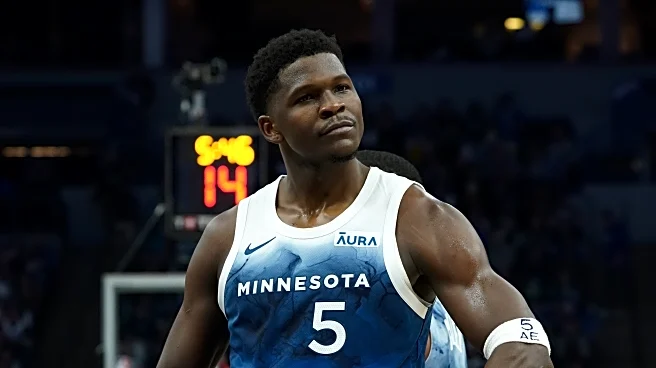The Minnesota Timberwolves have always been a little bit like pro wrestling. Think about it: the larger-than-life personalities, the constant sense of drama, the occasional betrayals, and the never-ending
hope that this time—this time—the storyline will finally pay off. Wolves fans, like diehard wrestling fans, live in a world of suspension of disbelief. One night you’re up 2-1 on the Lakers in the playoffs, the next you’re arguing on message boards about whether a 19-year-old rookie is the “face of the franchise” or just another midcarder doomed to the “What If?” section of basketball history.
And like Vince McMahon at his most chaotic, the Wolves front office has been known to book some absolutely bizarre gimmick matches. Draft a point guard when you already have three? Sure. Trade Kevin Garnett for Al Jefferson and a coupon book? Why not. Blow up a borderline contender because Latrell Sprewell didn’t want to feed his family for $21 million? Of course. This franchise has been stuck in “weird pay-per-view side story” mode for so long that when the main event finally shows up (hello, Anthony Edwards) it feels like the arena forgot how to cheer properly.
So what better way to honor the Wolves’ strange, maddening, hilarious history than by giving their most iconic (and semi-iconic) players their wrestling alter-egos? Not the obvious comparisons either—you’re not getting “KG is Hulk Hogan” or “KAT is Big Show” surface-level stuff. No, this is about vibe, storytelling, and how each guy’s Wolves tenure matches a WWE legend.
Welcome to the Timberwolves Wrestling Federation. The card is stacked, the crowd is rowdy, and if history is any guide, the main event is probably going to get interrupted by a run-in.
Kevin Garnett = The Undertaker
Every WWE needs its immortal. The guy who sets the tone, terrifies opponents, and keeps reinventing himself while still being the face of the company. That’s Kevin Garnett for the Timberwolves.
Like the Undertaker, KG carried himself with an aura that went beyond stats. The snarls, the chest slaps, the sheer intensity—it was his version of the gongs and the lights going dark. You didn’t just watch Garnett play; you felt him take over the arena.
Both guys had insane longevity. Undertaker stretched his career across three decades of WWE storylines. KG dragged the Wolves from expansion afterthoughts to legit contenders, then returned years later as the elder statesman passing down wisdom to the kids.
And when it came to loyalty? Undertaker never left WWE, even when everyone else was bolting to WCW. KG gave Minnesota everything he had, despite the roster disasters and front office blunders. For the Wolves, Garnett is the Undertaker: iconic, terrifying, untouchable. The franchise’s one true legend.
Stephon Marbury = Shawn Michaels
Every great wrestling duo needs its “Sexy Boy.” The flash, the swagger, the undeniable charisma that makes you believe you’re watching the next big thing. That was Stephon Marbury in Minnesota: the Heartbreak Kid of the late ’90s Timberwolves.
Like Shawn Michaels in his prime, Marbury had it all: quickness, flair, the handles, the confidence to take the big shot without blinking. When paired with Garnett, it felt like the Wolves had their own HBK–Diesel tag team. The kid from Brooklyn throwing alley-oops to the kid from South Carolina was supposed to be our long-running championship act.
But just like Michaels, Marbury wasn’t always easy to keep in the locker room. He wanted the spotlight, wanted to run his own show. And when he forced his way out of Minnesota, it was like Shawn superkicking Marty Jannetty through the barbershop window—spectacular, shocking, and the end of something that could’ve been special.
Wally Szczerbiak = Mr. Perfect
Some guys are just born to play a role, and Wally Szczerbiak was Minnesota’s very own Mr. Perfect. The hair? Perfect. The jumper? Pure as it gets. The form on his free throws? Like a training video. Wally didn’t just play basketball, he looked good doing it.
Much like Curt Hennig strutting into the WWF ring with his smug grin and flawless dropkicks, Wally carried himself like he belonged on a poster. But just like Mr. Perfect, there was a little bit of theater in the whole act. Wally never quite lived up to the hype as the #6 overall pick in 1999 and his pretty boy entitlement didn’t always mesh with the edginess of Garnett. Still, there’s no denying that his mid-range jumper was so pretty you’d swear it should’ve been framed in the Louvre.
Wally wasn’t KG, he wasn’t Marbury, and he wasn’t Cassell or Spree. But he was the Perfect Sidekick. Just like Hennig, he made everything look a little cleaner, a little flashier, and a little more fun.
Sam Cassell = The Rock
Finally… Sam Cassell has come back to Minnesota!
If you lived through the 2003–04 Timberwolves season, you know this one is spot-on. Cassell wasn’t just a point guard; he was an entertainer. He had the swagger, the colorful trash talk, and the undeniable ability to make the crowd rise every single night. He strutted around the court with the same bravado The Rock brought to the squared circle.
Like The Rock, Cassell always knew how to control the room. He’d hit a clutch jumper, backpedal with his signature dance, and the Target Center would lose its mind. It was theater. He wasn’t the biggest name on the roster, but he made you feel like the moment mattered. And just like The Rock dropping a perfectly timed eyebrow raise, Cassell knew when to take over and when to let KG cook.
The Rock had “The People’s Elbow.” Cassell had the elbow jumper. Both moves were unstoppable and were about more than just points or pain. They were about showmanship.
Of course, Cassell also gave us one of the most Timberwolves moments of all time: tweaking his hip doing the “Big Balls Dance” in the 2004 playoffs. That’s not just Cassell, that’s pro wrestling right there. A little over-the-top, a little absurd, but completely unforgettable.
For one glorious year, Sam Cassell was The Rock of Minneapolis, electrifying, dramatic, and impossible to look away from. And honestly? The Wolves haven’t had a showman like him since.
Latrell Sprewell = Stone Cold Steve Austin
If Sam Cassell was The Rock, then Latrell Sprewell was obviously Stone Cold Steve Austin.
Think about it. Stone Cold was pure chaos — glass shattering, stomping mudholes, middle fingers blazing. Sprewell was that same energy in basketball form. You never quite knew what you were going to get. Some nights he was dropping 25 with that deadly pull-up jumper. Other nights he was barking at refs, scowling at teammates, and serving up cans of whoop ass to anyone who dared stand in his way.
And just like Stone Cold, Spree never fit the cookie-cutter mold. He’d been suspended for choking his coach, cast off by the Knicks, branded a malcontent, and dropped into Minneapolis like an anti-hero with nothing to lose. Then he helped lead the Wolves to their greatest season ever. He was the guy who made them a little scarier, a little grittier, a little more unpredictable.
Did it end well? Of course not. This is the Timberwolves we’re talking about. The “I’ve got a family to feed” contract dispute is still the single most Stone Cold quote in NBA history. That’s not a press conference answer. That’s a promo. That’s Spree standing in the middle of the ring with a mic, flipping off Glen Taylor and demanding more money before hitting Kevin McHale with a steel chair.
Kevin Love = CM Punk
If there was ever a Timberwolf who embodied CM Punk’s “voice of the voiceless” mantra, it was Kevin Love.
Love showed up in Minnesota after the the O.J. Mayo trade. He wasn’t flashy. He wasn’t dunking on people. He looked like the guy you’d see at your local YMCA who just happened to hit threes and grab every rebound like it was a personal insult someone else even tried. But soon enough, he became the guy screaming, “Respect me, dammit!”
CM Punk built his legacy on two things: being criminally underrated by the establishment, and then cutting the promo of a lifetime to demand recognition. Kevin Love’s career arc in Minnesota followed that exact script. He piled up double-doubles like it was breathing. He won the Three-Point Contest. He put up 30–30 in a game. And yet the Wolves were still a mess, wasting his prime while the national media barely gave him credit.
When Punk dropped the Pipebomb in 2011, it was him saying, “I’m the best in the world, but you don’t treat me like it.” Kevin Love’s version of that moment was basically his entire 2012–2014 Wolves tenure. He’d throw out thinly veiled shots in interviews, side-eye the organization for wasting years of his career, and even air his grievances about teammates and management to the press. Love was never subtle. He wanted the world to know: I’m elite, this franchise is not.
And just like Punk eventually walked out on WWE, Love moved on from Minnesota in 2014. He was traded to Cleveland, got his title, and cemented himself in history as the third star on a Finals-winning team. Did it sting? Absolutely. Was it understandable? Totally. That’s the Punk playbook: fight your guts out, demand recognition, realize the machine will never fully back you, and then escape to a bigger stage where you can finally prove everyone wrong.
Ricky Rubio = Rey Mysterio
Rubio showed up with more hype than any international Wolves pick ever. He was supposed to be the Spanish savior, a teenage prodigy with hair like a Jonas Brother and vision like Magic Johnson. Just like Rey, he didn’t look like he belonged at first glance. Too skinny. Too young. Too flashy. And then he started tossing no-look passes, whipping behind-the-back dimes in transition, and making Target Center gasp in ways it hadn’t since KG’s prime. He was a human highlight reel on a team that had no business producing highlights.
Rey Mysterio made a career of hanging with the giants despite being undersized, winning over fans because of his heart and creativity. Rubio was the same, not the fastest, not the strongest, couldn’t shoot to save his life, but somehow, he belonged. When Rubio was on the floor, the Wolves felt watchable. And in mid-2010’s Minnesota, that was a superpower.
Of course, like Rey’s career, it came with injuries. Knees betrayed Ricky over and over, robbing him of his peak just as it seemed like things were finally clicking. He never quite became the franchise-altering star some fans dreamed of, but like Rey, he was the ultimate fan favorite. Every kid with a Wolves jersey wanted “RUBIO” on the back, and every die-hard remembers the buzz he brought.
Rubio was our masked magician, turning a Tuesday night game against the Bucks into a must-see event because you never knew when he’d pull off the basketball version of a 619. Did he ever lead us to glory? No. But he made Timberwolves basketball feel fun again, and in a lost era, that mattered.
Karl-Anthony Towns = Jeff Hardy
Jeff Hardy was never boring. He was spectacular. He was frustrating. He was charismatic and reckless and half the time you weren’t sure if he was going to pull off a Swanton Bomb or land on his neck and break in half. That’s Karl-Anthony Towns in a nutshell.
KAT is the Wolves’ Jeff Hardy because when he’s good, he’s breathtaking. Seven-footers aren’t supposed to hit 30-footers with a smooth stroke. They’re not supposed to handle the ball like guards, throw no-look passes out of the post, or drop 60 points in an NBA game like it’s light work. Towns at his peak feels like Hardy climbing the ladder in a TLC match. You can’t take your eyes off him, you know you’re about to see something ridiculous, and half the arena is standing because they can sense a “holy sh*t” moment.
But with Hardy, the brilliance always came with baggage. Missed time. Strange storylines. Questionable decisions outside the ring. Towns has mirrored that rollercoaster. The injuries, the foul trouble, the goofy quotes that make Wolves fans bury their faces in their hands (“greatest big man shooter ever” is both true and the kind of line you can’t say out loud without becoming a meme). Sometimes KAT feels like he’s destined to be the supporting act rather than the headliner.
And yet… just like Hardy, Wolves fans would ride or die with him. There was always hope that this was the run, that he’d finally put it all together, channel the athletic gifts, stay healthy, and stop making that one inexplicable turnover with three minutes left in a playoff game.
Towns was our high-flyer. Sometimes maddening, sometimes transcendent, but always capable of doing something no one else in the league, or in the Wolves’ history, could dream of pulling off.
Jaden McDaniels = Kane
Every great superstar has a tag-team partner who doesn’t say much but absolutely terrifies everyone. Enter Kane. The Big Red Machine. The guy who could step over the top rope, throw a choke slam, and suddenly the whole arena would shift from “ooh this is fun” to “uh oh, somebody’s about to get wrecked.”
That’s Jaden McDaniels. He’s not the face of the franchise, not the guy selling jerseys outside Target Center, but every single Wolves fan knows his value. And every opponent really knows his value. McDaniels guards the best player on the other team night after night like it’s a personal vendetta. Luka, SGA, LeBron. It doesn’t matter. They all end up in Jaden’s torture chamber.
Like Kane, he’s not flashy in the traditional sense. You don’t get the over-the-top promos or chest-thumping stats. But the intimidation factor is off the charts. His wingspan might as well come with pyro every time he closes out on a three. His defense is so suffocating it feels like the lights are about to go out in the arena and the creepy organ music is about to hit.
And just like Kane’s occasional outbursts, the sudden chair shots, the fireballs, Jaden has his own streak of unpredictability. Wolves fans will never forget him breaking his hand punching a wall in 2023. Total chaos, totally unnecessary, but somehow fitting.
At his best, McDaniels is the enforcer who gives the Wolves their edge. He doesn’t need to be Ant’s spotlight partner. He just needs to lurk in the shadows, ready to unleash hell when the moment calls for it. Every great dynasty has its monster in the corner, and for the Wolves, that monster is treacherous Jaden McDaniels.
Anthony Edwards = John Cena
You know that feeling when the music hits and the crowd just erupts because they know the guy running down the ramp isn’t just a star, he’s the franchise? That’s Anthony Edwards. That’s John Cena.
Cena was WWE’s “face of the company” for more than a decade. Polarizing at times, sure, but undeniable. He carried the brand, he sold the tickets, he closed the show, and he always, always rose above hate. Ant has slid right into that same role for the Timberwolves. He’s the face of the team, the heartbeat of the franchise, the guy whose jersey you see everywhere in Target Center. And much like Cena, he’s got that generational charisma where even his haters secretly love watching him.
Think about it: the Wolves spent decades wandering through the desert, chasing stars who either flamed out, sulked out, or just checked out. Then Edwards shows up and suddenly the whole thing feels different. The swagger, the dunks, the interviews where he somehow roasts you and charms you at the same time. It’s all Cena 101. Hustle, loyalty, respect. Or in Ant’s case, buckets, bravado, and pure Minnesota basketball joy.
Here’s the kicker: Cena was famous for winning the big ones. Sometimes too famous. The “LOL Cena wins” meme was a thing for a reason. But Edwards? He’s already got that aura. That of course he’s going to hit the big shot, of course he’s going to close the series, of course he’s going to be the Finals MVP someday vibe. Wolves fans went from Charlie Brown with the football to knowing we’ve got the ball in Ant’s hands and he’s never letting Lucy yank it away.
So yeah, if KG was the Undertaker, if Sprewell was Stone Cold, if Sam-I-Am was The Rock, then Edwards is our John Cena. The face who finally made Minnesota basketball feel like it belongs under the bright lights. The champ is here. And this time, he’s not leaving.
Pro wrestling works best when you suspend disbelief, buy into the hype, and invest in the characters, even if deep down you know it might all end in heartbreak. Sound familiar, Wolves fans?
This list isn’t just silly comparisons; it’s a way of understanding why we keep showing up. Like wrestling, the Wolves have had their share of bad booking, weird heel turns, and missed pushes. But if you’re still here, if you’re still watching, you’re part of the show. And as with WWE, you can’t help but wonder: is the best storyline still to come?









